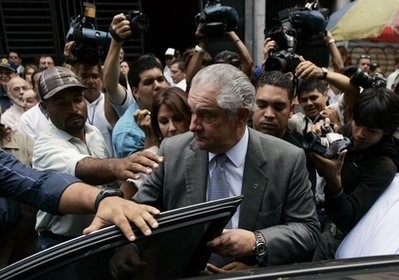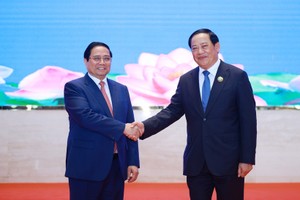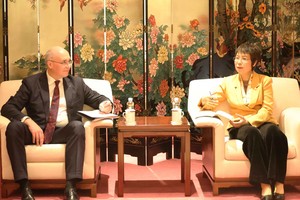Opposition leaders and human rights groups condemned Thursday's arrest of Guillermo Zuloaga, the owner of Globovision, who was detained on a warrant by military intelligence agents and released hours later after appearing in court. Critics called the case a major setback for freedom of speech, saying it shows the government is growing increasingly intolerant and authoritarian as its popular support has slipped.
Zuloaga was detained while authorities investigate his "offensive" remarks against the president at an Inter American Press Association meeting in Aruba, Attorney General Luisa Ortega said. Zuloaga had joined other media executives at the forum last weekend in criticizing Chavez's government for limiting free speech and cracking down on critics.

The Attorney General's Office said in a statement that prosecutors are investigating Zuloaga for violating a law prohibiting Venezuelans from spreading "false information through any medium," including newspapers, radio, television, e-mails or leaflets, "that cause public panic."
Zuloaga, Globovision's majority shareholder, could face a five-year prison sentence if convicted, the statement said. He was released Thursday night after a judge issued an order preventing him from leaving the country while prosecutors proceed with their investigation.
Zuloaga said agents detained him at an airport in the northwestern state of Falcon as he was preparing to fly his private plane with his wife to the Caribbean island of Bonaire, where they planned to vacation.
His arrest could be a decisive development in Chavez's drive to rein in a channel he has accused of trying to undermine his government. Globovision has been the only stridently anti-Chavez channel on the air since another opposition-aligned channel, RCTV, was forced off cable and satellite TV in January. RCTV was booted off the open airwaves in 2007.
Chavez said late Thursday, without mentioning Zuloaga's name, that he is pleased to see justice functioning in Venezuela.
"I respect the autonomy of the branches of government, but I applaud ... the end of impunity," Chavez told reporters before leaving on a trip to Ecuador. "Whoever breaks the law has to respond before the authorities. ... Who can criticize that?"
Pro-Chavez lawmaker Manuel Villalba urged prosecutors on Wednesday to investigate Zuloaga for allegedly saying Venezuela's government is cracking down on critics and purportedly commenting that it was a shame a short-lived 2002 coup against Chavez failed.
Zuloaga said what he did was simply "relate some historical events," insisting he did nothing wrong and that all Venezuelans have a right to say what they think about public figures such as presidents.
"I have a right to give opinions," Zuloaga said after his release, speaking at Globovision's studios while employees applauded and cheered. He called the accusations "ridiculous" and denied he had been planning to flee the country.
Arresting Zuloaga shows Chavez's government is "acting like a totalitarian government, like Cuba," said Alejandro Aguirre, president of the Miami-based Inter American Press Association, which has clashed with Chavez for years on free-speech issues.
Zuloaga has previously been singled out by authorities. Last May, prosecutors began investigating him for a suspected "environmental crime" related to wild animals he had hunted and mounted in his Caracas home. The following month, prosecutors charged Zuloaga with usury, alleging unlawful markups at two Toyota dealerships that he jointly owns after authorities seized 24 vehicles being stored at a home he owns.
Zuloaga's arrest also came three days after opposition politician Oswaldo Alvarez Paz was detained for remarks made on a Globovision talk show March 8.
Alvarez Paz has been charged with conspiracy, spreading false information and publicly inciting crime after remarking that Venezuela has turned into a haven for drug traffickers. He also said he backed allegations by a Spanish judge that Venezuela's government has cooperated with the Basque separatist group ETA and Colombian rebels.
Chavez has dismissed those accusations as lies. Alvarez Paz stands by his words and denies breaking the law.
Human Rights Watch condemned both arrests.
"To prosecute someone for speech, which should be protected under any standard of democracy, is a dangerous precedent," Jose Miguel Vivanco, the group's Americas director, said in a statement. "For years, Chavez has been pushing legislation to restrict free speech. ... Now we seem to be entering a darker period in which he is enforcing these draconian laws."
Miguel Henrique Otero, editor of the Venezuelan newspaper El Nacional, said Zuloaga's arrest shows Chavez's government is growing more authoritarian and starting to "look more like a traditional dictatorship."
He said he thinks the government is acting now because Chavez has been losing popularity and "they're nervous."
Chavez remains the country's most popular politician, but his support has dipped as the economy contracts and as Venezuelans cope with inflation, rampant crime and rolling blackouts in parts of the country.
Chavez's popularity slipped below 50 percent in polls late last year, and has hovered between 40 percent and 50 percent in recent months, said pollster Luis Vicente Leon of the Caracas-based firm Datanalisis.
























